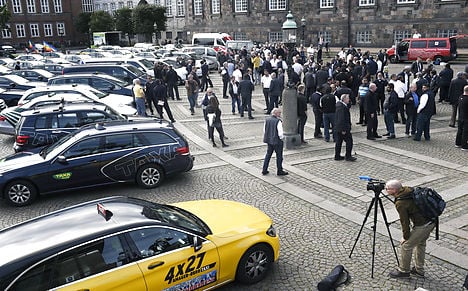UBER
Danish taxi drivers call for action against Uber
Hundreds of taxi drivers parked their vehicles in front of the Danish parliament building on Wednesday in protest against the rideshare service Uber.
Published: 16 September 2015 15:59 CEST

Angry taxi drivers filled Christiansborg Slotsplads on Wednesday. Photo: Emil Hougaard/Scanpix
Christiansborg Slotsplads was lined with taxis on Wednesday as some 300 taxi drivers demonstrated against what they said were illegal practices from Uber drivers.
The group Taxi Drivers in Denmark (TID) organized the protest as a way to prod the Danish government into taking on a formal complaint the taxi drivers filed against Uber when it made its Denmark debut in November 2014.
“We want to tell the politicians that Uber is violating the law. They earn more money for driving customers than allowed,” TID chairman Søren Nikolaisen told broadcaster DR.
The taxi drivers argue that the ridesharing service Uber Pop creates unfair competition because Uber’s drivers and vehicles aren’t required to live up to the same requirements as others in the taxi business, one of the most thoroughly-regulated industries in Denmark.
The Danish Transit Authority filed a police complaint against Uber in November and the Copenhagen Police confirmed in May that preliminary charges had been filed against the American company, but the case has yet to go to court.
TID says they have also reported around 200 Uber drivers to the police this year but no action has been taken.
For its part, Uber has argued that it is not a taxi company but rather a ridesharing programme and therefore should not be held to the same requirements as others in the taxi business.
On Wednesday, a company spokesman said that its drivers were not making money.
“Much of what the taxi industry says about us is not true. Most of the people who driver for us aren’t earning anything off of it. We are experiencing a growing interest from our partners and passengers,” Mathias Thomsen told DR.
TID’s Nikolaisen dismissed the company’s argument.
“Of course they are making money. Nobody drives around all day without making money,” he countered.
Upon announcing its arrival in Copenhagen, Uber said it would offer two services: Uber Black, in which customers are picked up by a chauffeur-driven luxury car, and Uber Pop, in which private vehicle owners drive customers in their own cars.
According to the company, Uber Pop is significantly less expensive than current market prices.
Url copied to clipboard!


 Please whitelist us to continue reading.
Please whitelist us to continue reading.
Member comments